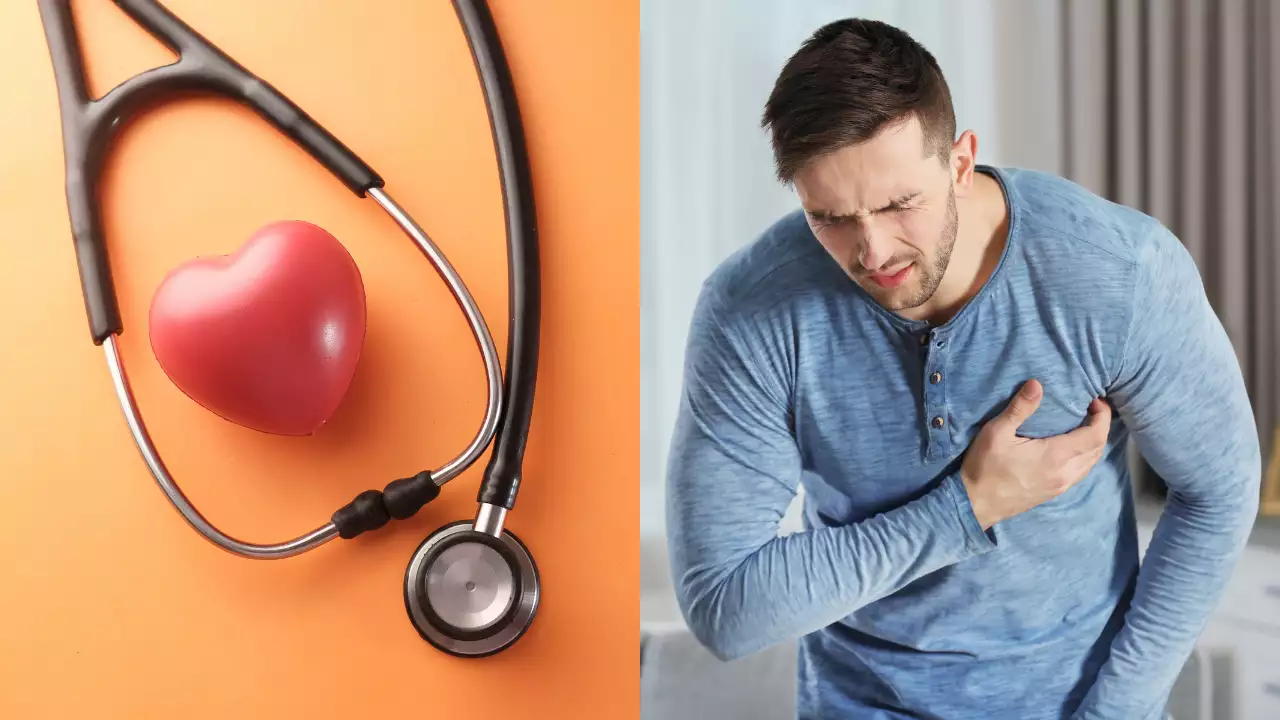Supriya Ramesh • 21 Nov 2024
Are You Having a Heart Attack Without Knowing It?

Image - Canva
A heart attack is the sudden cessation of blood supply to a portion of the heart that occurs when a blood vessel is occluded. Blood vessel occlusion, also known as vascular occlusion, is a blockage in an artery or vein that prevents blood from flowing through the body.
While typical symptoms that suggest the occurrence of a heart attack are a feeling of heaviness or weight in the centre of the chest at times with radiation to the left arm and profuse sweating, can a heart attack happen without you knowing it? Can it truly be silent? These questions consistently bother us. So, to find answers to frequently bothersome questions on heart attack, we speak with an expert—Dr Rakesh Rai Sapra, Clinical Director and Head of the Department of Cardiology, Marengo Asia Hospitals, Faridabad.
“It is very unlikely that a person will have a heart attack without knowing it. It is more likely that a person suffers a heart attack without realising it. This happens when symptoms are subtle, like mild chest discomfort or just feeling unwell or more of a burning sensation associated with nausea and vomiting mimicking gastritis,” Dr Sapra says, adding that the chest discomfort of a heart attack is more of heaviness rather than sharp or pin-pricking pain.
Who is more at risk for a silent heart attack?
People with other illnesses like diabetes or renal failure are more likely to face subtle symptoms and so can be considered more prone to a silent heart attack. Similarly, some people don’t express or complain about symptoms, especially females, which can again be a problem.
How do you save yourself from a silent heart attack?
Well, the best way, Dr Sapra says, is to be vigilant. “Don’t ignore such subtle or confusing signals, especially if they are coming at an odd hour like late night or early morning. It is much better to get an ECG done at that time before thinking of it as a gastritis issue.
What should you do when you suspect a heart attack?
According to Dr Sapra, the simple way of confirming a heart attack is to do an ECG. There are other simple tests also, like echocardiography, and some blood tests called cardiac enzymes, which help in confirming the diagnosis.
What are the first aid medications?
“There are two first aid medications that should be stored at home. They are aspirin and sorbitrate tablets. Aspirin, which is a blood thinner, should be chewed completely, and sorbitrate, which is a blood vessel relaxing agent, should be kept under the tongue,” Dr Sapra says, adding that doing this leads to a rapid effect as they are absorbed directly in the blood from the mouth as compared to swallowing with water, where it needs to pass through the liver before reaching the blood.
Emergency angioplasty vs. clot buster medication
Emergency angioplasty is the fastest way to open the blocked heart artery and restore flow to the suffering portion of the heart. “But if emergency angioplasty is not available or not affordable, then there are clot-buster medications that help in dissolving the clot and are life-saving,” Dr Sapra says.
What is the risk if you do not undergo immediate treatment?
“The person can develop an abnormal heart rhythm called arrhythmia, which can lead to cardiac arrest and can be fatal. One can also develop marked breathing difficulty due to the development of acute heart failure, which again can put life at risk,” he says.
What is cardiac arrest?
Sudden cardiac arrest means sudden cessation of cardiac function or simply sudden stoppage of heartbeat. “This essentially is due to an electrical abnormality of the heart, which in medical terms is called an arrhythmia. In this, either there is a sudden and complete loss of electrical activity of the heart, which leads to stoppage of cardiac contractions and is called asystole, or the heart beats abnormally fast in and the heart pumping becomes ineffective and is called ventricular fibrillation,” Dr Sapra says.
Is sudden cardiac arrest different from a heart attack?
“Yes, sudden cardiac arrest and heart attack are different. However, both are cardiac emergencies. Sudden cardiac arrest is more dangerous, and if not immediately helped, at that very moment by cardiac resuscitation, will lead to death within minutes,” he explains.
A heart attack, on the other hand, Dr Sapra says, is not so catastrophic, and the patient can be taken to the hospital for urgent treatment. However, one should remember that a heart attack can lead to abnormal heartbeats or arrhythmia and is the most common cause of sudden cardiac arrest.
What should you do if you witness cardiac arrest?
According to Dr Sapra, basic life support or basic cardio-pulmonary resuscitation can save the life of anyone experiencing sudden cardiac arrest. In this, you lay that person flat on his back and then press the centre of his chest around 100 times a minute, and if possible, give one or two breaths by mouth-to-mouth breathing after every 30 compressions,” he explains, adding that this maintains the blood circulation and keeps the person alive. He says that after this, the person should be rushed to a hospital or call for an ambulance while doing CPR, where definitive treatment can be done.
Get Latest News Live on Times Now along with Breaking News and Top Headlines from Health and around the world.